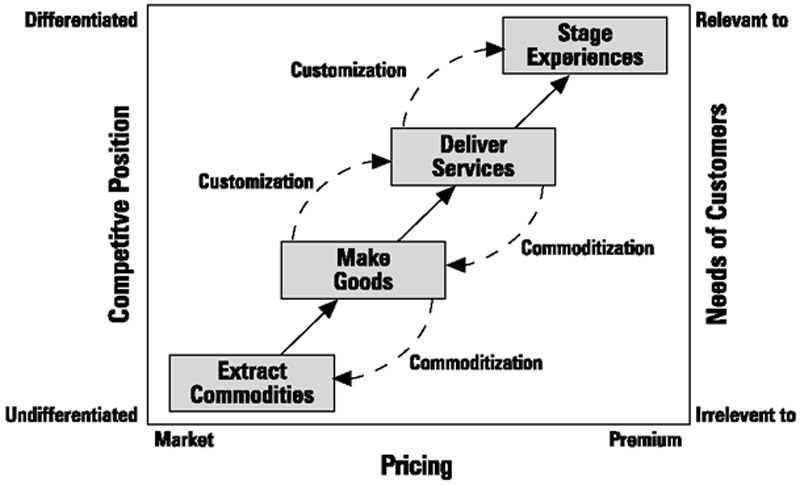Last Tuesday Sitecore’s event, Digital Trendspot took place in Ede, the Netherlands. Joe Pine’s keynote “The Experience is the Marketing” was about the opportunities and infinite possibilities offered by the digital world. During the presentation he inspired the audience with many examples and the evolution of economic value creation.
After the presentation I had the chance to interview Mr. Pine about the Experience Economy and the Multiverse.
Economic value
Pine argues that businesses must orchestrate memorable events for their customers, and that memory itself becomes the product – the “experience”. The following image shows Pine’s vision of economic value creation. From commodities up to experiences which are the customization of the previous stage.
On the question what the next level of economic value is, Pine explained that the fifth and final economic value is the transformation. A transformation is a customized experience. Companies that help them achieve their aspirations are those who will thrive and have competitive advantage.
The Multiverse: Sensemaking tool
Pine defines 8 worlds in his Multiverse. The Multiverse is a framework that consists of eight different worlds in which people experience their lives. The most simple one being the world in which you are immerged when you are playing a computer game and the one you see when you look up: real life.
For a more in-depth explanation of the Multiverse, have a look at the video here .
The Multiverse is a sensemaking tool that allows to organizations to figure out and categorize opportunities, and to generate new ideas. The true challenge and value proposition is recognizing experiences that crosses the boundaries of these worlds.
…there’s a shift happening from stageing experiences to setting the stage for experiences. This essentially is the platform business, the open business.
Experiences and co-creation
Upon the question how experiences can be ‘controlled’ in a co-creation business strategy Pine argued that experiences are always co-created, happening in the minds of the customers. In the current business environment though there’s a shift happening from stageing experiences to setting the stage for experiences. This essentially is the platform business, the open business.
Customer sacrifice
One of the topics Pine talked about during the presentation was customer sacrifice and the difference with customer satisfaction.
Customer sacrifice is the gap between what a customer settles for and what he/she really wants. Customer satisfaction is a measure of how products and services meet or surpass customer expectation.
Every time a provider of a good or service interacts with a customer, both parties have an opportunity to learn. Eventually, one party changes his behavior as a result of that learning. Unfortunately, all too often that’s the customer. He starts asking for something other than what he really wants – or perhaps he simply goes away.
One of the slides showed that the more interactions a provider had, the less the customer sacrifice there was. Less customer sacrifice turns an ordinary service into a memorable event.
The increasingly demanding customer doesn’t want to settle, he knows there are many possibilities and social media is intensifying the challenge because of its transparency and dynamics.
Customer sacrifice and the organization
On the question what the biggest challenge of customer sacrifice is according to Mr. Pine, he elaborated that it are the “points of learning”. For organizations to understand where people are sacrificing and how they need to measure that.
The organization needs to be agile because it needs to change its operations and processes accordingly to respond to the sacrifice.
Next to this, the organization needs to be agile because it needs to change its operations and processes accordingly to respond to the sacrifice.
Not only reactively, but also proactively this means co-creation at the core of the organization. Involving customers in business processes, creating better and more efficient customer-centric output.
Social media and experiences
Enhance: Social media data beholds lots of insights that –when correctly flowed throughout the organization- can lower customer sacrifice and enhance the experience.
Enrich: From the experential point of view, social media are cost-effective means to enrich the experience. Think of Heineken that crowdsources and involves customers through Facebook.
Another example is BMW, who lets people design their own BMW on Facebook through an application, ending up in an average four hour of customer attention to the brand. Isn’t this the dream of every marketer?
Both Heineken and BMW offer goods but have found great experential ways of involving people and let them be part of the brand. Pine elaborated that being part of something is part of human nature, people want to belong. Social media technologies are important means in providing these platforms.
From this point of perspective as well, an open business by means of social media, their data and technologies offer the opportunities and competitive advantage over closed organizations.
Have a look at the Infinite Possibility website for more information on the Multiverse, books and all kinds of social media sources.
What do you think of Pine’s experience economy and what does that mean for your innovation efforts?
By Gianluigi Cuccureddu
About the author:
 Gianluigi Cuccureddu, contributing editor, is an experienced writer specializing in innovation, open business, new media and marketing. He is also Managing Partner of the 90:10 Group, a global Open Business consultancy, which helps clients open their activity directly and indirectly to external stakeholders through the use of social media, its data and technologies for the purpose of competitive advantages in marketing, service- and product innovation.
Gianluigi Cuccureddu, contributing editor, is an experienced writer specializing in innovation, open business, new media and marketing. He is also Managing Partner of the 90:10 Group, a global Open Business consultancy, which helps clients open their activity directly and indirectly to external stakeholders through the use of social media, its data and technologies for the purpose of competitive advantages in marketing, service- and product innovation.








